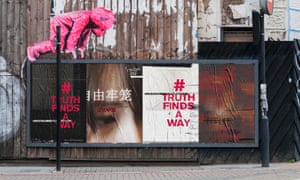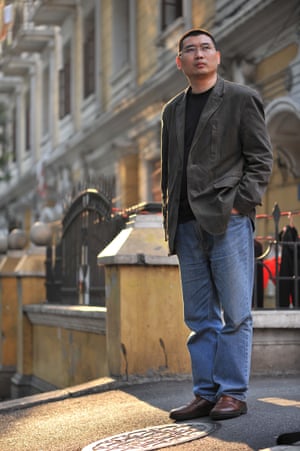
Journalist Chang Ping remembers his first brush with Chinese press censorship. “In early 1998, I sent a reporter in Beijing to interview rock singer Cui Jian, to talk about the difficulty of revolt. The propaganda department was very unhappy about it and chided me harshly; I was criticised for ‘promoting a capitalist view of the press’.”
This was the first of many run-ins the writer and editor had with the authorities while working for the Chengdu Commercial Daily. Eventually, he was sacked and forced into exile, first in Hong Kong, and then, after refusing to bow to intimidation from both governments, Germany, where he continues to write critically about the Communist party’s policies and human rights abuses.
All of which made Chang a natural choice for the Uncensored Playlist, an ingenious joint initiative by Reporters Without Borders Germany (RSF Germany), an NGO dedicated to defending the freedom of the press, and DDB Berlin, its long-time PR agency. While mentoring some university students and brainstorming ways to negate censorship, Patrik Lenhart and Marco Lemcke, creatives at DDB, discovered an interesting loophole. Despite many repressive regimes’ bans on social media sites and search engines, music streaming services – particularly Apple Music, Deezer and Spotify – continued to be freely available.

This got them thinking: why not turn censored articles into pop songs to bypass the firewalls and slip these stories back into countries where they had been forbidden? They presented the idea to RSF Germany’s executive director, Christian Mihr, who loved it, and so they began fleshing out the proposal. First, they had to choose the countries, a task that Mihr says wasn’t easy. Of those that were open enough to allow at least one of the services they wanted to employ, which would benefit the most from raised awareness?
Eventually, they settled on China, Egypt, Thailand, Uzbekistan and Vietnam, then set about choosing five journalists, another tricky task. The dangers facing dissenters in these countries can be severe – as Chang says: “Many of my friends have been imprisoned and even tortured.” Chang and Vietnam’s Bùi Thanh Hiếeu were already exiled, but the others – Egypt’s Basma Abdelaziz, a Thai collective known as Prachatai, and Uzbekistan’s Galima Bukharbaeva – continue to live and work in their homelands. It is testament to RSF Germany’s standing, and belief in the project, that none of the five declined the invitation.
The journalists were asked to choose two articles that were representative of their work and their country’s situation. Then, over the course of a number of interviews with musical director Lucas Mayer and his team, lyrics were written – in English and their native language – before local musicians were hired to make the songs a reality. The results can now be streamed almost anywhere in the world.
The decision was made early on not to inform the streaming services about the project. “We just did it,” says Lenhart. “We sneaked them on to spark people to find loopholes, to prove we could beat the censors.” Nor does Mihr expect them to get in touch or complain; in fact, he thinks they tacitly approve. “Once we’d gone public, Amazon Germany asked if it could also publish the playlist. So it seems these services are unafraid, and actually like the idea.”
I ask whether any of the regimes have cottoned on, and, if so, what they might do. Mihr says it is impossible to block specific songs; they would have to block the whole site, which he thinks is unlikely. Lenhart adds that they must know – the Vietnamese songs made into the Top 10 streaming chart – but is equally unworried about a backlash. Besides, says Lemcke: “We made sure that our songs, articles, lyrics and album covers are downloadable, so even if somebody can’t get access, the idea and the music will always be out there. People will always have the opportunity to reach it.”
Everyone at RSF Germany and DDB is optimistic, both about the project’s impact and the fight for freedom of speech. Lenhart concedes it may be “a small step and a small victory, but it’s a great message to send”.
For the journalists themselves, they believe that truth will find a way. As Chang puts it: “Every voice has an echo. As my daughter and I left China, we sat on the train crossing one border after another. She discovered that the trees and flowers looked the same and said with excitement: ‘Dad, spring comes to every country!’ I said: ‘Yes, every country will see springtime, including the homeland to which we cannot return.’”
Source:-.theguardian



